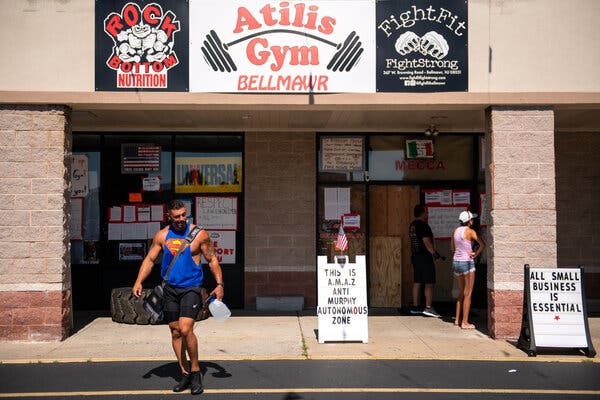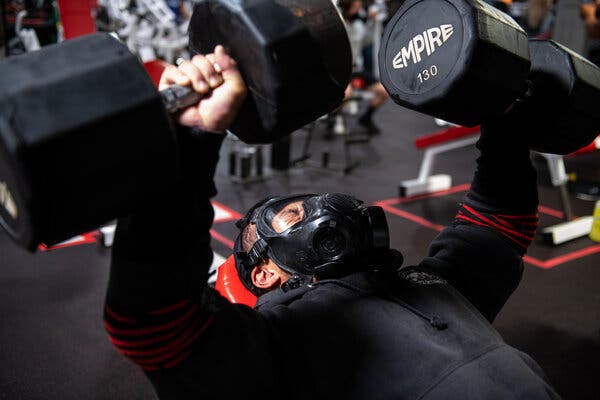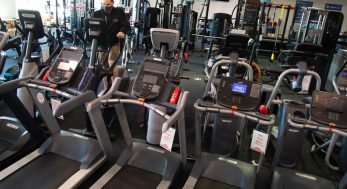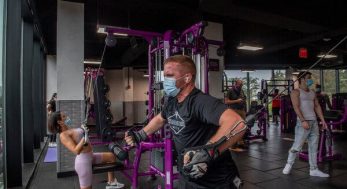Advertisement
New Jersey is one of seven states where health clubs have been barred from reopening. The governor says it’s too soon, but some gym owners are rebelling.

In an act of defiance, Joe Logue, a retired Marine, affixed a military gas mask and headphones before beginning his chest-and-arm workout at a New Jersey gym that had gone rogue.
It is illegal for health clubs to be open for anything other than private training sessions in New Jersey, one of only seven states where gyms have been deemed to be so high risk for spreading the coronavirus that they remain either fully or partially closed.
But the owners of Mr. Logue’s gym, Atilis, about 10 miles southeast of Philadelphia in Bellmawr, have repeatedly flouted the governor’s executive order, filing a lawsuit that sought to overturn the shutdown while staging numerous reopening events that are equal parts civil disobedience rallies and publicity stunts.
Mr. Logue was one of the first people to enter the cavernous gym on a recent Saturday morning after owners kicked down plywood that had covered the space where the doors — removed so they could not be padlocked — once stood.
“This is my release,” said Mr. Logue, 28, who said weight lifting had helped him chase away demons that had dogged him since he was injured in 2012 while on duty in Afghanistan. “I was basically drinking every night, fighting. I was getting in a lot of trouble.”
Atilis’s persistent pressure underscores the growing tension between Gov. Philip D. Murphy and another group of business owners in dire straits because of the outbreak: gym owners struggling for survival after nearly five months of a mandated pandemic lockdown.

Licensed health clubs are among the last types of businesses that will be allowed to reopen, and the governor has shown few signs of relenting. Similar pressure is mounting in New York, where last week Gov. Andrew M. Cuomo, who has been sued by a group of health club owners, called gyms “highly problematic” and said they would remain closed for now.
Doctors and scientists seem to be in broad agreement that significant risks are posed by performing intense exercises indoors, which could produce high concentrations of the virus, and by equipment that is touched frequently. Two clubs in New Mexico have been linked to a small number of virus cases.
“It’s mostly about ventilation, air movement,” said Dr. Joshua L. Santarpia, a professor at the University of Nebraska’s Medical Center who studies bioaerosols and has conducted research on the coronavirus. “The smaller particles are going to move with the air flow.”
Last Thursday, state senators in New Jersey held a hearing on the subject, adding to the growing clamor at a time when the rate of coronavirus transmission in New Jersey had risen slightly, a worrisome trend the governor blamed in part on indoor parties among young people.
The state’s transmission rate, a key benchmark, dipped back below 1 on Monday, indicating that each infected person was passing the virus to fewer than one other person.
“It’s a dire situation and they are desperate,” Andrew Alfano, chief executive of Retro Fitness, testified at the Senate hearing about the financial hardship of the five-month closure. “These are people who will never financially recover.”
Some gyms have moved weights and exercise classes outside to sidestep the rules. Other health clubs are liquidating and selling off equipment online. On Monday, a judge ruled for the second time against Atilis, ordering that the doors that were kicked down less than two weeks earlier be barricaded anew.
The owners, whose business license was revoked on Tuesday by the borough of Bellmawr, have vowed to continue to press their case in court with help from contributions from nearly 4,000 donors.
There are an estimated 40,000 to 50,000 health and fitness clubs in the United States, including more than 1,100 in New Jersey, according to the International Health, Racquet & Sportsclub Association, a nonprofit trade group.
At least 43 states have allowed gyms to reopen in some or all parts of the state. But the association estimates that clubs nationwide have lost $7 billion through July 1, and that a quarter are in danger of closing for good by the end of the year without additional federal funding.
A research paper by MIT’s Sloan School of Management in May that weighed a business’s risk of reopening against its societal benefits ranked gyms near the bottom, concluding that “gyms, cafes, and liquor, tobacco and sporting goods stores should face tighter restrictions and open later.”
In New Jersey, however, liquor stores were deemed essential and never ordered to close. Exercise studios that offer other high-intensity indoor activities like dance, martial arts and gymnastics, in classes that tend to draw children, were allowed to reopen at reduced capacity last month. The governor has also permitted sports like football to begin full-contact outdoor practices.
All of it smacks of inconsistency to Frank Trumbetti, who bought Atilis Gym last June with his business partner, Ian Smith.
“We shouldn’t have to fight this hard to fight for our rights,” Mr. Trumbetti, 51, said. “I don’t comprehend the lack of equal application of the law.”
His mother, Lucia, who was 77, died of Covid-19 in May after being hospitalized for an unrelated ailment, and he said he respected the potency of the virus.
With each reopening, Atilis said it had been adhering to a reduced occupancy limit of 44. Each visitor was given a disinfectant spray bottle to wipe down equipment before and after use. Temperatures were scanned at the door. Masks, however, were optional.
The Coronavirus Outbreak ›
Frequently Asked Questions
Updated August 12, 2020
-
Can I travel within the United States?
- Many states have travel restrictions, and lots of them are taking active measures to enforce those restrictions, like issuing fines or asking visitors to quarantine for 14 days. Here’s an ever-updating list of statewide restrictions. In general, travel does increase your chance of getting and spreading the virus, as you are bound to encounter more people than if you remained at your house in your own “pod.” “Staying home is the best way to protect yourself and others from Covid-19,” the C.D.C. says. If you do travel, though, take precautions. If you can, drive. If you have to fly, be careful about picking your airline. But know that airlines are taking real steps to keep planes clean and limit your risk.
-
I have antibodies. Am I now immune?
- As of right now, that seems likely, for at least several months. There have been frightening accounts of people suffering what seems to be a second bout of Covid-19. But experts say these patients may have a drawn-out course of infection, with the virus taking a slow toll weeks to months after initial exposure. People infected with the coronavirus typically produce immune molecules called antibodies, which are protective proteins made in response to an infection. These antibodies may last in the body only two to three months, which may seem worrisome, but that’s perfectly normal after an acute infection subsides, said Dr. Michael Mina, an immunologist at Harvard University. It may be possible to get the coronavirus again, but it’s highly unlikely that it would be possible in a short window of time from initial infection or make people sicker the second time.
-
I’m a small-business owner. Can I get relief?
- The stimulus bills enacted in March offer help for the millions of American small businesses. Those eligible for aid are businesses and nonprofit organizations with fewer than 500 workers, including sole proprietorships, independent contractors and freelancers. Some larger companies in some industries are also eligible. The help being offered, which is being managed by the Small Business Administration, includes the Paycheck Protection Program and the Economic Injury Disaster Loan program. But lots of folks have not yet seen payouts. Even those who have received help are confused: The rules are draconian, and some are stuck sitting on money they don’t know how to use. Many small-business owners are getting less than they expected or not hearing anything at all.
-
What are my rights if I am worried about going back to work?
- Employers have to provide a safe workplace with policies that protect everyone equally. And if one of your co-workers tests positive for the coronavirus, the C.D.C. has said that employers should tell their employees — without giving you the sick employee’s name — that they may have been exposed to the virus.
-
What is school going to look like in September?
- It is unlikely that many schools will return to a normal schedule this fall, requiring the grind of online learning, makeshift child care and stunted workdays to continue. California’s two largest public school districts — Los Angeles and San Diego — said on July 13, that instruction will be remote-only in the fall, citing concerns that surging coronavirus infections in their areas pose too dire a risk for students and teachers. Together, the two districts enroll some 825,000 students. They are the largest in the country so far to abandon plans for even a partial physical return to classrooms when they reopen in August. For other districts, the solution won’t be an all-or-nothing approach. Many systems, including the nation’s largest, New York City, are devising hybrid plans that involve spending some days in classrooms and other days online. There’s no national policy on this yet, so check with your municipal school system regularly to see what is happening in your community.
Mr. Murphy, who backtracked on his plan to permit indoor dining as cases began to surge in other states that reopened early, has said it is simply too soon to open gyms in a state where 15,878 deaths have been linked to the virus.
“It’s something we want to get to,” Mr. Murphy said on Monday. “We also want to get to it and not kill anybody.”
On Monday, after the judge ruled against Atilis, the state’s attorney general, Gurbir S. Grewal, said he took “no pleasure in this process.”
“But we’re in the middle of a global pandemic and defendants have defied multiple court orders,” Mr. Grewal said in a statement. “If we’re going to prevent a second wave of Covid-19 in New Jersey, we need everyone in this state — including gym owners — to do their part and follow the law.”
Gym owners and managers who believe it is time to relax Mr. Murphy’s executive order stress the mental and physical health benefits of exercise. They maintain that there is little difference between their businesses and martial arts, dance and gymnastic studios, which have been operating in New Jersey at 25 percent capacity for more than a month with no reports of an outbreak.
Leslie Adelman Banks, a managing partner of Fitness and Wellness, which runs nine health centers in New Jersey, said the ability to exercise indoors is especially crucial for people already living with medical challenges.
At a facility Fitness and Wellness operates in Pennsylvania, which reopened in June, people with ailments that would put them at high risk if they contracted Covid-19 are determined to use exercise as a way to build their strength, she said.
“They’re the first ones in the door because they are so fearful of their health declining,” Ms. Adelman Banks said during last Thursday’s hearing. “Our M.S. patients. Our Parkinson’s patients. Our cardiac patients.”
“We are a safe haven for them,” she added, “and without coming to us they’re not exercising.”
Jonathan Skolnik, operations director of Center Stage Dance and Theater School in East Brunswick, N.J., said the school has taken an “overly cautious” approach since reopening last month.
All students are required to wear masks. And the studios are misted with a cleaning solution between classes, which are staggered so that the equipment has time to dry, he said.
Jenna Varano, program director at South Jersey Storm Cheerleading in Deptford, said summer camps are up and running and competitive cheerleading squads are practicing with fewer students, heightened safety precautions and waivers that must be signed every two weeks by parents.
“People were reluctant at first,” Ms. Varano said in an interview. “But I think people realize we are doing everything we can. They feel safe.”
Lauren Hard contributed reporting.

